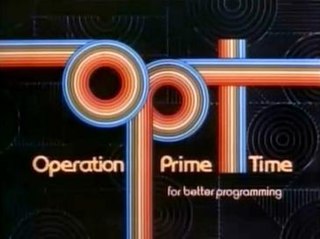| Type | 'Occasional' TV network |
|---|---|
| Parent | SFM Entertainment |
| Established | 1978 |
The SFM Holiday Network was an 'occasional' network from SFM Media which aired on holiday weekends (such as the 4th of July, Christmas, etc.) from 1978 until 1991. [1]
The network would usually clear 88% of the U.S. [2]
After the success of the Mobil Showcase Network, SFM Media launched its own occasional network, SFM Holiday Network in 1978. [3] [2] For 1982, 11 films were scheduled by the network. [2] In 1983, the Network started its season in March with 150 stations. [3]
Popcorn magnate Orville Redenbacher hosted the show (his company was a main sponsor of the Holiday Network), in special segments with his grandson. [4] The theme song used for many of the SFM Holiday Network broadcasts, including the commercial "bumpers", was Johnny Pearson's "Heavy Action", which was also used as the instrumental theme for Monday Night Football . [5]
SFM would arrange for programming by giving part of the advertising to the movie companies, while the station would get about half the ad time. SFM would end up with 7.5 to 15 minutes of advertising time to sell for each 2 to 3 hour movie. [2]

Disney Channel is an American pay television channel that serves as the flagship property of Disney Branded Television, a unit of the Disney Entertainment division of The Walt Disney Company.

James Gilmore Backus was an American actor. Among his most famous roles were Thurston Howell III on the 1960s sitcom Gilligan's Island, the father of James Dean's character in Rebel Without a Cause, the voice of the near-sighted cartoon character Mr. Magoo, the rich Hubert Updike III on the radio version of The Alan Young Show, and Joan Davis' character's husband on TV's I Married Joan. He also starred in his own show of one season, The Jim Backus Show, also known as Hot Off the Wire.

Theme music is a musical composition which is often written specifically for radio programming, television shows, video games, or films and is usually played during the title sequence, opening credits, closing credits, and in some instances at some point during the program. The purpose of a theme song is often similar to that of a leitmotif.

The Movie Channel (TMC) is an American premium television network owned by Showtime Networks, a subsidiary of Paramount Global operated through its Paramount Media Networks division. The network's programming mainly features first-run theatrically released and independently produced motion pictures, and during promotional breaks between films, special behind-the-scenes features and movie trivia.

Nick at Nite is a nighttime programming block on the American basic cable channel Nickelodeon. The programming broadcasts from prime time to late night. The block initially consisted of syndicated sitcoms and films from the 1950s to the 1970s. Nick at Nite gradually shifted its programming to primarily airing sitcoms as recent as the mid-1990s to the 2010s.

Journey Back To Oz is a 1972 American animated adventure musical fantasy film produced by Filmation. It is loosely based on L. Frank Baum's second Oz novel The Marvelous Land of Oz (1904), although Baum received no screen credit.

The ABC Sunday Night Movie is a television program that aired on Sunday nights, first for a brief time in 1962 under the title Hollywood Special to supposedly replace an open time slot for the TV show Bus Stop, which was cancelled after March 1962. It then began airing regularly under its more commonly known title from late 1964 to 1998, on ABC. Since 2004, it has aired sporadically as a special program, now titled the ABC Sunday Movie of the Week, though as of the 2011-12 television season, the only films in this timeslot were aired under the Hallmark Hall of Fame banner, which transferred to ABC in that season. However, in 2014, The Hallmark Hall of Fame moved exclusively to cable on the Hallmark Channel. As a result of this, the Sunday Night Movie is now exclusively relegated to two special holiday movies, The Sound of Music every holiday season and The Ten Commandments every Easter.

Orville Clarence Redenbacher was an American food scientist and businessman most often associated with the brand of popcorn that bears his name which is now owned by Conagra Brands. The New York Times described him as "the agricultural visionary who all but single-handedly revolutionized the American popcorn industry".
John Valmore Pearson was a British composer, orchestra leader and pianist. He led the Top of the Pops orchestra for sixteen years, wrote a catalogue of library music, and had many of his pieces used as the theme music to television series.

The Lexington Broadcast Services Company was a television production and syndication company founded on November 15, 1976, by advertising pioneer Henry Siegel, who, according to Advertising Age, was "the man who built Lexington Broadcast Services into the nation's largest barter syndicator, and thus defined that segment of the TV ad business."

The CBS Late Movie is a CBS television series during the 1970s and 1980s. The program ran in most American television markets from 11:30 p.m. (ET/PT) until 2:30 a.m. or later, on weeknights. A single announcer voiced the introduction and commercial bumpers for each program, but there was no host per se, or closing credits besides those of the night's presentation.

The Tonight Show Starring Johnny Carson is an American late-night talk show hosted by Johnny Carson on NBC, the third iteration of the Tonight Show franchise. The show debuted on October 1, 1962, and aired its final episode on May 22, 1992. Ed McMahon served as Carson's sidekick and the show's announcer.

Night Tracks is an American music video television program that aired on TBS in late night on Fridays and Saturdays from June 3, 1983 to May 30, 1992. Created and produced by Thomas W. Lynch and Gary Biller through Night Tracks, Inc. and distributed by Turner Program Services, the program was developed to capitalize on the burgeoning popularity of the music video medium after MTV helped bring it into the mainstream following its debut in October 1981.

The Pink Panther is a fictional animated character who appears in the opening and/or closing credit sequences of every film in The Pink Panther series except for A Shot in the Dark and Inspector Clouseau. In the storyline of the original film, the "Pink Panther" is the name of a valuable pink diamond named for a flaw that shows a "figure of a springing panther" when held up to the light in a certain way; in the credits this was translated to an animated pink panther. Only the first Pink Panther film and its third sequel, The Return of the Pink Panther, featured the diamond.

Home Box Office (HBO) is an American pay television network, which is the flagship property of namesake parent-subsidiary Home Box Office, Inc., itself a unit owned by Warner Bros. Discovery. The overall Home Box Office business unit is based at Warner Bros. Discovery's corporate headquarters inside 30 Hudson Yards in Manhattan's West Side district. Programming featured on the network consists primarily of theatrically released motion pictures and original television programs as well as made-for-cable movies, documentaries, occasional comedy, and concert specials, and periodic interstitial programs.
"Heavy Action" is a musical piece composed by Johnny Pearson for KPM Music. Composed in 1970, and featuring a strong brass and string fanfare opening, "Heavy Action" soon became a well established sporting theme tune, most associated in the United Kingdom as the theme for Superstars and in the United States as the theme music for ABC and ESPN's Monday Night Football. APM Music exclusively controls the rights to the song in North America.

SFM Entertainment is an American television syndicator, film distributor, production company, and licensing firm established on September 29, 1969. SFM Entertainment is known for setting up 'occasional' networks. The name comes from the initials of the company's founders: Walter Staab, Robert Frank, and Stanley Moger.

Operation Prime Time (OPT) was a consortium of American independent television stations to develop prime time programming for independent stations. OPT and its spin-off syndication company, Television Program Enterprises (TPE), were formed by Al Masini. During its existence, OPT was considered the de facto fourth television network. OPT was also called an occasional television network and occasional program alternative.
The Mobil Showcase Network, also known as Mobil Showcase or Mobil Showcase Theatre, was an occasional television network from 1976 to 1984 with an ad hoc group of stations.
The early history of television in the United States, particularly between 1956 and 1986, was dominated by the Big Three television networks: the American Broadcasting Company (ABC), the Columbia Broadcasting System (CBS) and the National Broadcasting Company (NBC). The term fourth television network was used within the industry during this era to refer to a theoretical fourth commercial broadcast (over-the-air) television network that would operate as a direct competitor to the "Big Three".